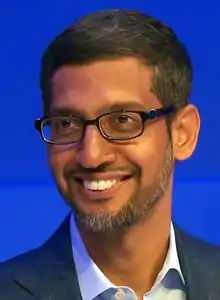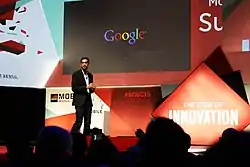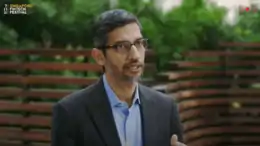Sundar Pichai
Pichai Sundararajan (born July 12, 1972[1]), known as Sundar Pichai (/ˈsʊndɑːr pɪˈtʃaɪ/), is an Indian-American business executive.[4] He is the chief executive officer (CEO) of Alphabet Inc. and its subsidiary Google.
Sundar Pichai | |
|---|---|
 Pichai in 2020 | |
| Born | Pichai Sundararajan July 12, 1972 |
| Citizenship | United States[1] |
| Education | IIT Kharagpur (BTech) Stanford University (MS) University of Pennsylvania (MBA) |
| Title | CEO of Alphabet and Google |
| Board member of | |
| Spouse(s) | Anjali Pichai |
| Children | 2 |
Born in Chennai, India,[1] Pichai earned his degree from IIT Kharagpur in metallurgical engineering. Moving to the United States, he attained an M.S. from Stanford University in materials science and engineering and further attained an MBA from the Wharton School of the University of Pennsylvania, where he was named a Siebel Scholar and a Palmer Scholar, respectively.[1]
Pichai began his career as a materials engineer. He joined Google in 2004, where he led the product management and innovation efforts for a suite of Google's client software products, including Google Chrome and Chrome OS, as well as being largely responsible for Google Drive. In addition, he went on to oversee the development of other applications such as Gmail and Google Maps. In 2010, Pichai also announced the open-sourcing of the new video codec VP8 by Google and introduced the new video format, WebM. The Chromebook was released in 2012. In 2013, Pichai added Android to the list of Google products that he oversaw.
Pichai was selected to become the next CEO of Google on August 10, 2015, after previously being appointed Product Chief by CEO, Larry Page. On October 24, 2015, he stepped into the new position at the completion of the formation of Alphabet Inc., the new holding company for the Google company family.
Pichai is included in Time magazine's 100 Most Influential People of 2020.[5]
Early life and education
Pichai was born in Madurai, Tamil Nadu, India.[6][7] His mother, Lakshmi, was a stenographer, and his father, Regunatha Pichai, was an electrical engineer at GEC, the British conglomerate. His father also had a manufacturing plant that produced electrical components.[8][9] Pichai grew up in a two-room apartment in Ashok Nagar, Chennai and had a Hindu upbringing.[8]
Pichai completed schooling in Jawahar Vidyalaya, a Central Board of Secondary Education school in Ashok Nagar, Chennai and completed the Class XII from Vana Vani school at IIT Madras.[10][11] He earned his degree from IIT Kharagpur in metallurgical engineering and is a distinguished alumnus from that institution.[12] He holds an M.S. from Stanford University in materials science and engineering, and an MBA from the Wharton School of the University of Pennsylvania,[13] where he was named a Siebel Scholar and a Palmer Scholar, respectively.[1][14][15]
Career

Pichai worked in engineering and product management at Applied Materials and in management consulting at McKinsey & Company.[16] Pichai joined Google in 2004, where he led the product management and innovation efforts for a suite of Google's client software products, including Google Chrome[17] and Chrome OS, as well as being largely responsible for Google Drive. He went on to oversee the development of other applications such as Gmail and Google Maps.[18][19] On November 19, 2009, Pichai gave a demonstration of Chrome OS; the Chromebook was released for trial and testing in 2011, and released to the public in 2012.[20] On May 20, 2010, he announced the open-sourcing of the new video codec VP8 by Google and introduced the new video format, WebM.[21]
On March 13, 2013, Pichai added Android to the list of Google products that he oversaw. Android was formerly managed by Andy Rubin.[22] He was a director of Jive Software from April 2011 to July 30, 2013.[23][24][25] Pichai was selected to become the next CEO of Google on August 10, 2015[26] after previously being appointed Product Chief by CEO, Larry Page. On October 24, 2015 he stepped into the new position at the completion of the formation of Alphabet Inc., the new holding company for the Google company family.[27][25][28]
Pichai had been suggested as a contender for Microsoft's CEO in 2014, a position that was eventually given to Satya Nadella.[29][30]
In August 2017, Pichai drew publicity for firing a Google employee who wrote a ten-page manifesto criticizing the company's diversity policies and arguing that "distribution of preferences and abilities of men and women differ in part due to biological causes and ... these differences may explain why we don't see equal representation of women in tech and leadership".[31][32][33][34] While noting that the manifesto raised a number of issues that are open to debate, Pichai said in a memo to Google employees that "to suggest a group of our colleagues have traits that make them less biologically suited to that work is offensive and not OK".[35]
In December 2017, Pichai was a speaker at the World Internet Conference in China, where he stated that "a lot of work Google does is to help Chinese companies. There are many small and medium-sized businesses in China who take advantage of Google to get their products to many other countries outside of China."[36][37]
In December 2019, Pichai became the CEO of Alphabet Inc.[38][39]

In December 2020, Pichai delivered a speech virtually at the Singapore FinTech Festival emphasizing inclusive digital economy.[40]
- The coronavirus outbreak has sped up the adoption of digital tools and trends by years........Southeast Asia's Internet economy is currently on the verge of a massive transformation......more than 40 million people in the region connected to the Internet for the first time in 2020 - four times as many as the year before......while Covid has accelerated the use of digital tools, it's also exposed how many people are still left behind......some 1.7 billion people around the world are still unbanked, a huge portion of African households do not have access to broadband and millions of women entrepreneurs lack the same access to opportunity as their male counterparts.[41]
- Pichai said at the conclusion of his speech,
- Our goal for the post-Covid world is to ensure the benefits of technology can be shared, as widely and equitably as possible. If we can do that, 2020 will be remembered not as the end of the world, but the beginning of a world that works better for everyone.[42]
U.S. Congress testimony
On December 11, 2018, Pichai testified before the U.S. House Judiciary Committee on a wide range of Google-related issues such as the alleged, potential political bias on Google's platforms, the company's alleged plans for a "censored search app" in China, and its privacy practices.[43] Pichai, in response, stated that Google employees cannot influence search results. He also stated that Google users can opt out of having their data collected and that "there are no current plans for a censored search engine" in China.[44] Wired's Issie Lapowsky characterized Pichai's appearance before the committee as one "major missed opportunity," since, as she wrote, its members "staked out opposite sides of a partisan battle," and presented to the public "a foreboding reminder of Congress's continued technological ignorance."[45]
In October 2020, the US Senate Commerce Committee unanimously voted, on bipartisan basis, to subpoena Sundar Pichai, along with the CEOs of Facebook and Twitter to force them to testify before the panel about concerns over the tech industry's key legal shield, under Section 230 of the Communications Decency Act of 1934.[46]
Personal life
He is married to Anjali Pichai, née Haryani, a chemical engineer from Kota, Rajasthan. They met as classmates at the Indian Institute of Technology Kharagpur.[47] The couple have two children.[48] Pichai's interests include football and cricket.[49][50]
References
- "Britannica". Retrieved December 18, 2020.
- "Company Overview of Alphabet Inc". Archived from the original on December 1, 2017. Retrieved November 26, 2017.
- "Magic Leap Organization". Archived from the original on November 16, 2017. Retrieved November 26, 2017.
- "Sundar Pichai emerges unscathed in test case for foreign-born CEOs". Archived from the original on December 20, 2018. Retrieved December 13, 2018.
- "Sundar Pichai: The 100 Most Influential People of 2020". Time. Retrieved September 23, 2020.
- Vaitheesvaran, Bharani; Elizabeth, Shilpa (August 12, 2015). "The rapid climb of Sundar Pichai to technology peak: From school days to Silicon Valley". The Economic Times. Archived from the original on February 3, 2016. Retrieved January 12, 2016.
- Charlie, Adith (August 11, 2015). "Google gets new parent Alphabet; Sundar Pichai becomes CEO of Google". VCCircle. Archived from the original on March 6, 2018. Retrieved March 6, 2018.
- "A shy, quiet boy who loved science". Bennett, Coleman & Co. Ltd. Mumbai Mirror. Archived from the original on August 15, 2015. Retrieved August 12, 2015.
- "Ten things about Sundar Pichai". dailyo.in. August 11, 2015. Archived from the original on August 15, 2015. Retrieved August 11, 2015.
- "Sundar Pichai, a quiet boy". The Hindu.
- "School mates talk about Sundar Pichai". The Hindu. Archived from the original on August 14, 2015. Retrieved August 14, 2015.<
- "Chennai's Sundar Pichai is dark horse". indiatimes.com. Archived from the original on March 6, 2015. Retrieved October 26, 2014.
- "The rise and rise of Sundar Pichai". Archived from the original on March 31, 2016. Retrieved August 11, 2015.
- Siebel Scholars Archived March 21, 2013, at the Wayback Machine. Siebel Scholars. Retrieved on August 23, 2013.
- Cooper, Charles (March 13, 2013). "Sundar Pichai:Seven prominent Indian-origin people in global IT world". CNET. Archived from the original on October 18, 2013. Retrieved March 14, 2013.
- Thoppil, Dhanya Ann (March 14, 2013). "Who Is Google Android's Sundar Pichai?". The Wall Street Journal. Archived from the original on April 29, 2014. Retrieved April 29, 2014.
- Lee, Dave (August 11, 2015). "Sundar Pichai: Google's new boss from humble roots". BBC. Archived from the original on August 11, 2015. Retrieved August 11, 2015.
- Cooper, Charles (March 13, 2013). "Meet Google new Android chief Sundar Pichai". CNET. Archived from the original on June 24, 2013. Retrieved March 14, 2013.
- Cooper, Charles (March 13, 2013). "Sundar Pichai: The man Google, Twitter fought for". CNET. Archived from the original on November 3, 2013. Retrieved March 14, 2013.
- Strohmeyer, Robert (November 19, 2009). "Google Chrome OS Unveiled: Speed, Simplicity, and Security Stressed". PCWorld. Archived from the original on September 24, 2012. Retrieved November 15, 2012.
- "Google Open Sourcing VP8 as Part of WebM Project — Online Video News". Gigaom.com. May 19, 2010. Archived from the original on November 12, 2012. Retrieved November 15, 2012.
- Olivarez-Giles, Nathan (March 13, 2013). "Google Replaces Android Boss Andy Rubin With Chrome's Sundar Pichai". Wired. Archived from the original on March 17, 2014. Retrieved March 13, 2013.
- "Who is Sundar Pichai?". NDTV.com. Archived from the original on March 10, 2014. Retrieved February 3, 2014.
- "Jive Elects Informatica Executive Margaret Breya to Board of Directors". Jive Software. Archived from the original on October 25, 2014. Retrieved February 12, 2014.
- Helft, Miguel (October 27, 2014). "The Incredibly Fast Rise of Sundar Pichai". Fortune. Archived from the original on April 3, 2015. Retrieved April 5, 2015.
- "G is for Google". Official Google Blog. Archived from the original on August 10, 2015. Retrieved August 10, 2015.
- "SEC Filing (Form 8-K) by Alphabet Inc". October 2, 2015. Archived from the original on July 9, 2017. Retrieved September 15, 2017.
- "Official Google Blog: G is for Google". Official Google Blog. Archived from the original on August 10, 2015. Retrieved August 10, 2015.
- Furrier, John (January 31, 2014). "Google SVP of Chrome & Apps Sundar Pichai now front runner for Microsoft CEO job". SiliconANGLE. Archived from the original on February 7, 2014. Retrieved February 3, 2014.
- Samuel Gibbs, The most powerful Indian technologists in Silicon Valley Archived April 11, 2016, at the Wayback Machine theguardian.com April 11, 2014.
- "Google's Ideological Echo Chamber" (PDF). Archived (PDF) from the original on August 8, 2017. Retrieved August 8, 2017.
- Wakabayashi, Daisuke (August 7, 2017). "Google Fires Engineer Who Wrote Memo Questioning Women in Tech". The New York Times. ISSN 0362-4331. Archived from the original on August 10, 2017. Retrieved August 8, 2017.
- "Here Are the Citations for the Anti-Diversity Manifesto Circulating at Google". Motherboard. Archived from the original on September 30, 2018. Retrieved August 8, 2017.
- Statt, Nick (August 7, 2017). "Google fires employee who wrote anti-diversity memo". The Verge. Archived from the original on August 8, 2017. Retrieved August 8, 2017.
- Warren, Tom (August 8, 2017). "Read Google CEO's email to staff about anti-diversity memo". The Verge. Archived from the original on August 8, 2017. Retrieved August 8, 2017.
- Liao, Shannon (December 4, 2017). "Apple's Tim Cook and Google's Sundar Pichai were surprise guests at China's internet conference". The Verge. Archived from the original on December 4, 2017. Retrieved December 5, 2017.
- Horwitz, Josh (December 4, 2017). "Tim Cook and Sundar Pichai's surprise remarks at China's "open internet" conference". QZ. Archived from the original on December 6, 2017. Retrieved December 5, 2017.
- "A letter from Larry and Sergey". Google. December 3, 2019. Retrieved December 3, 2019.
- Feiner, Lauren (December 3, 2019). "Larry Page steps down as CEO of Alphabet, Sundar Pichai to take over". CNBC. Retrieved December 4, 2019.
- "Sundar Pichai's words of wisdom for digital growth and expansion". The Indian Express. December 8, 2020. Retrieved December 12, 2020.
- "Expand Internet connectivity to cover those left behind: Google CEO Sundar Pichai". The Straits Times. December 7, 2020. Retrieved December 12, 2020.
- "Google and Alphabet CEO Sundar Pichai: 'Online has been a lifeline in Southeast Asia'". Finextra.com. December 7, 2020. Retrieved December 12, 2020.
- D’Onfro, Jillian (December 11, 2018). "Google's Sundar Pichai was grilled on privacy, data collection, and China during congressional hearing". CNBC. Retrieved December 3, 2019.
- Abril, Danielle (December 11, 2018). "Lawmakers Grill Google CEO Sundar Pichai. But He Emerges Merely Singed". Fortune. Retrieved December 3, 2019.
- Lapowsky, Issie (December 11, 2018). "The Sundar Pichai Hearing Was a Major Missed Opportunity". Wired. Retrieved December 3, 2019.
- "Senate Commerce votes to issue subpoenas to CEOs of Facebook, Google and Twitter". CNN. Retrieved October 1, 2020.
- Jane, Mary. "Anjali Pichai (Sundar Pichai Wife) Age, Biography, Height & Family". www.dreshare.com.
- Barrabi, Thomas (December 5, 2018). "Who is Google CEO Sundar Pichai?". FOXBusiness.
- "Sundar Pichai visits FC Barcelona". F.C Barcelona website. March 2, 2017. Retrieved December 4, 2019.
- Sharma PunitJ, Itika (June 24, 2019). "Sundar Pichai just proved that you can take an Indian out of India but not India out of an Indian". Quartz India. Retrieved December 4, 2019.
External links
| Wikimedia Commons has media related to Sundar Pichai. |
- Sundar Pichai on Twitter

- "Sundar Pichai's rise to fame in 90 seconds", Tech Gurus, The Daily Telegraph
| Business positions | ||
|---|---|---|
| Preceded by Larry Page |
CEO of Google 2015–present |
Incumbent |